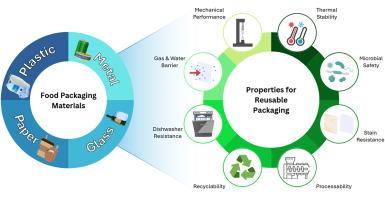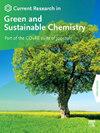The function and properties of common food packaging materials and their suitability for reusable packaging: The transition from a linear to circular economy
Q2 Materials Science
Current Research in Green and Sustainable Chemistry
Pub Date : 2024-01-01
DOI:10.1016/j.crgsc.2024.100429
引用次数: 0
Abstract
For the last few decades, plastics have been the material of choice for food packaging applications. Combining mechanical performance with barrier properties and transparency, plastics have been a cost-effective solution for safely distributing food produce. Unfortunately, most plastic packaging is based on a linear model where packaging is designed for single use, resulting in vast amounts of post-consumer waste being generated annually. In response to this concern, many public and private bodies globally have set ambitious sustainable development targets with the goal of reducing plastic waste. To assist in meeting these targets, the implementation of reusable packaging schemes has been suggested. These schemes aim to prolong the lifespan and worth of plastic packaging and have the potential to reduce the environmental impact of single-use plastics, provided all aspects of their design are carefully considered. One design aspect often neglected is the influence of repeated use on the properties of the packaging material. Very little literature exists investigating the effects that repeated contamination and washing can have on the material's intrinsic properties. This review article aims to comprehensively review the functions and properties of various food packaging materials to assess their suitability for reusable food packaging applications.

常见食品包装材料的功能和特性及其对可重复使用包装的适用性:从线性经济向循环经济过渡
过去几十年来,塑料一直是食品包装应用的首选材料。塑料兼具机械性能、阻隔性能和透明度,是安全分销食品的一种经济有效的解决方案。遗憾的是,大多数塑料包装都是基于线性模型设计的,即包装是为一次性使用而设计的,因此每年都会产生大量的消费后废弃物。针对这一问题,全球许多公共和私营机构都制定了雄心勃勃的可持续发展目标,旨在减少塑料垃圾。为了帮助实现这些目标,有人建议实施可重复使用包装计划。这些计划旨在延长塑料包装的使用寿命和价值,并有可能减少一次性塑料对环境的影响,但前提是必须仔细考虑其设计的各个方面。经常被忽视的一个设计方面是重复使用对包装材料特性的影响。很少有文献研究反复污染和清洗对材料内在特性的影响。这篇综述文章旨在全面回顾各种食品包装材料的功能和特性,以评估它们是否适合可重复使用的食品包装应用。
本文章由计算机程序翻译,如有差异,请以英文原文为准。
求助全文
约1分钟内获得全文
求助全文
来源期刊

Current Research in Green and Sustainable Chemistry
Materials Science-Materials Chemistry
CiteScore
11.20
自引率
0.00%
发文量
116
审稿时长
78 days
 求助内容:
求助内容: 应助结果提醒方式:
应助结果提醒方式:


